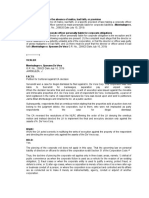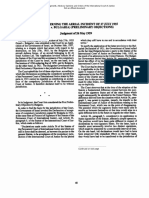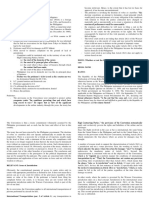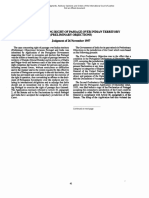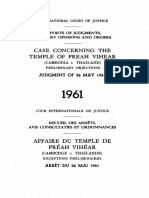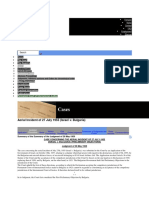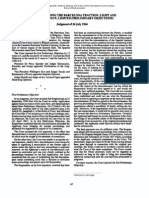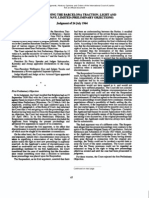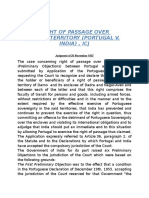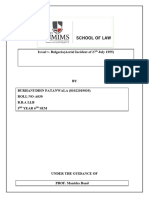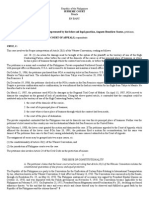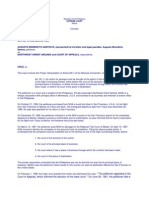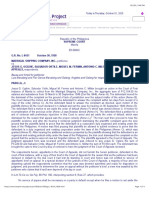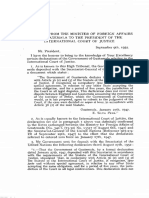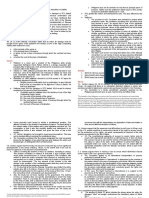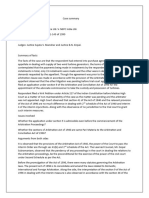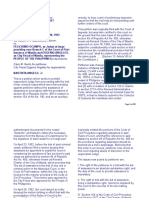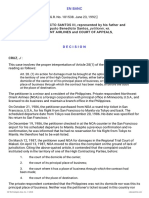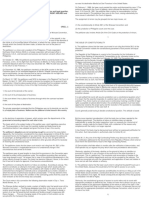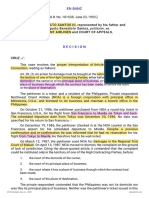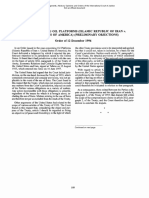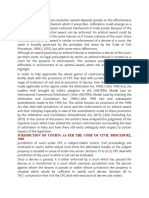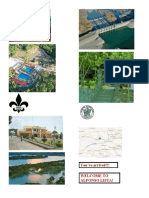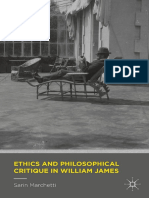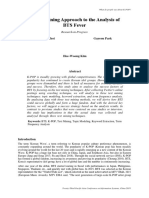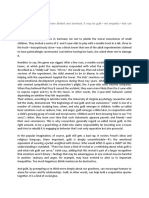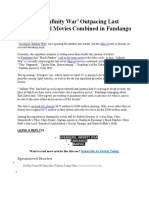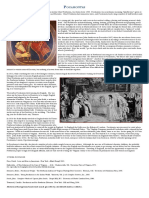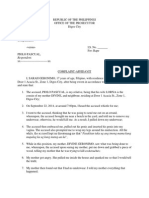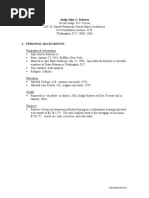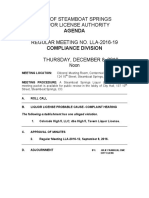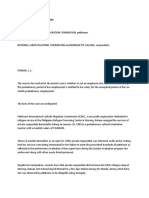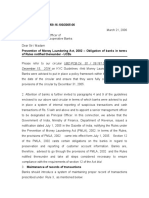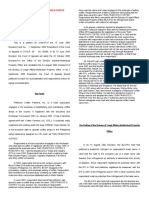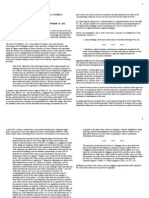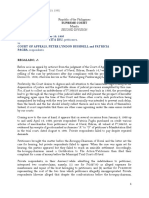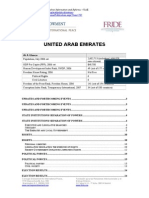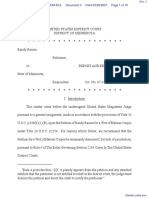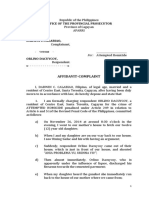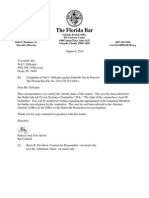Case Concerning The Tempile of Preah Vihear (Preliminary Obje :tions) of May
Case Concerning The Tempile of Preah Vihear (Preliminary Obje :tions) of May
Uploaded by
Korina MarawisCopyright:
Available Formats
Case Concerning The Tempile of Preah Vihear (Preliminary Obje :tions) of May
Case Concerning The Tempile of Preah Vihear (Preliminary Obje :tions) of May
Uploaded by
Korina MarawisOriginal Title
Copyright
Available Formats
Share this document
Did you find this document useful?
Is this content inappropriate?
Copyright:
Available Formats
Case Concerning The Tempile of Preah Vihear (Preliminary Obje :tions) of May
Case Concerning The Tempile of Preah Vihear (Preliminary Obje :tions) of May
Uploaded by
Korina MarawisCopyright:
Available Formats
Summaries of Judgments, Advisory Opinions and Orders of the International Court of Justice
Not an official document
CASE CONCERNING THE TEMPILE OF PREAH VIHEAR
(PRELIMINARY OBJE<:TIONS)
Judgment of 26 May 1961
Proceedings in the case coricerning the Te:mple of Preah ty's Government hereby renew the declaration above
Vihear (Preliminary Objectil~ns)between Camtdia and mentioned for a further period of ten years as from May 3,
Thailand, which relates to the territorial sovereignty over the 1950, with the limits and subject to the same conditions
Temple of Preah Vihear, were instituted by an Application by and reservations as set forth in the first declaration of Sept.
the Government of Cambodia dated 30 September 1959. The 20, 1929."
Government of Thailand raised two pmliminary objections Thailand had raised a first preliminary ol)jection on the
to the jurisdiction. ground that that declaration did not constitute a valid accept-
The Court held, unanimously, that it had jurisdiction. ance on her part of the compulsory jurisdiction of the Court.
Vice-President Alfaro and Judges Wellington Koo, Sir Ger- She in no way denied that she had fully intended to accept the
ald Fitzmaurice, and Tanaka appended declarations to the compulsoryjurisdiction but, according to her argument, she
Judgment and Judges Sir Percy Spender and Morelli had drafted her declaration in terms revealed by the decision
appended separate opinions. of the Court of 26 May 1959in the case concerningthe Aerial
Incident of 27 July 1955 (Israel v. Bulgaria) to have been
ineffectual. Article 36, paragraph 5, of the Statute of the
Court provided that:
"Declarations made under Article 36 of the Statute of
the Permanent Court of International Justice and which are
In its Judgment the Court noted that, in invoking the juris- still in force shall be deemed, as between the parties of the
diction of the Court, Cambodia had based herself principally present Statute, to be acceptances of the compulsory juris-
on the combined effect of her ,ownacceptance of the compul- diction of the International Court of Justice for the period
sory jurisdiction of the Courl: and of a declaration made by which they still have to run and in accordance with their
Thailand on 20 May 1950 which was in the fcdlowing terms: t e r n *:
"I have the honour to inl'orm you that by a declaration The Court had held that that provision applied only to the
dated September 20, 192!J, His Majesty' s Government original parties to the Statute, and that, Bulgaria not having
had accepted the compulslury jurisdiction of the Perma- become a party to the Statute until 14 Deceinber 1955, her
nent Court of International Justice in conformity with declaration of acceptance of the compulsory jurisdiction of
Article 36, paragraph 2, of the Statute for a peiiod of ten the Perrnanent Court must be regarded as having lapsed on
years and on condition of rt:cipmity. That declaration has 19 April 1946, the date when the Permanent Court had
been renewed on May 3, 1'940, for another period of ten ceased to exist. In the present case, Thailand had proceeded
years. on the basis that her position was the same as that of Bul-
"In accordance with the jprovisions of Article 36, para- garia, since she had become a party to the Statute only on 16
graph 4, of the Statute of ,the International Coilrt of Jus- December 1946, some eight months after the demise of the
tice, 1have now the honoui: to inform you hat His Majes- Permanent Court. Her declaration of acceptance of the com-
Continued on next page
pulsory jurisdiction of the Permanen. Co~rrtwould accord- The sole relevant question was therefore whether the lan-
ingly not have been transformed into an acceptance relating guage employed irr Thailand's 1950 declaration did reveal a
to the present Court, and all she actually would have clear intention, in the terms of Article 36, paragraph 2, of the
achieved was a necessarily inoperative renewal of an accep- Statute, 'to recogniise as compulsory the jurisdiction of the
tance of the compulsory jurisdiction of a1 tribunal that no Court. If the Court applied its normal canons of interpreta-
longer existed. tion, that declaration could have no other meaning than as an
The Court did not consider that its Judgment of 1959 had acceptance of the compulsory jurisdiction of the present
the consequences which Thailand claimecl. Apart from the Court, since there was no other Court to which it could have
fact that that Judgment had no binding force except between related. Thailand, which was fully aware of the non-
the parties, the Court took the view that Thailand, by her dec- existence of the foimer Court, could have had no other pur-
laration of 20 May 1950, had placed hemelf in a different pose in addressing the Secretary-General of the United
position from Bulgaria. At that date, not only had Thailand's Nations under paragraph 4 of Article 36 of the Statute than to
declaration of 1940 never been transforme:dinto an accept- recognise the compulsory jurisdiction of the present Court
ance of the compulsory jurisdiction of the pizsent Court, but, under paragraph 2 c~fthat Article; nor indeed did she pretend
indeed, it had expired, according to its own .terms,two weeks otherwise. The remainder of the declaration had to be con-
earlier (on 6 May 1950). The declaration af 20 May 1950, a strued in the light ofthat cardinal fact, and in the general con-
new and independent instrument, had nctt therefore been text of the declaration; the reference to the 1929 and 1940
made under Article 36, paragraph 5, of the Statute, the oper- declarations must tte regarded simply as being a convenient
ation of which, on any view, was wholly exhausted so far as method of indicating, without stating them in terms, what
Thailand was concerned. were the conditions upon which the acceptance was made.
In the course of the proceedings there had been some dis- The Court, therefore, considered that there could not
cussion as to whether a lapsed instrument cc~uldbe renewed, remain any doubt as to what meaning and effect ought to be
but the Court considered that the real question was, what was attributed to the 1950declaration and it rejected the first pre-
the effect of the declaration of 1950. It had also been said that liminary objection I I Thailand.
~
Thailand had in 1950 held a mistaken view and for that rea-
son had used in her declaration language w.hich the decision
of 1959 had shown to be inadequate to achieve its purpose,
but the Court did not consider that the issue in the present
case was really one of error, It had also been argued that the
intent without the deed did not suffice to c:onstitute a valid The Court next found that that conclusion was sufficientto
legal transaction, but the Court considered that, in the case of found the Court's ju.risdiction and that it became unnecessary
acceptances of the compulsoryjurisdiction, the only formal- to proceed to a consideration of the second basis of jurisdic-
ity rsquired was that of deposit with the Secretary-Generalof tion invoked by Czmbodia (certain treaty provisions for the
the United Nations, a formality which hiad been accom- judicial settlement of any disputes of the kind involved in the
plished by Thailand in accordancewith Article 36, paragraph present case) and of Thailand's objection to that basis of
4, of the Statute. jurisdiction.
You might also like
- Angus Dawson - Public Health Ethics - Key Concepts and Issues in Policy and Practice-Cambridge University Press (2011) PDFDocument247 pagesAngus Dawson - Public Health Ethics - Key Concepts and Issues in Policy and Practice-Cambridge University Press (2011) PDFKorina MarawisNo ratings yet
- Chapter 1 - INTRODUCTION TO ANATOMY AND PHYSIOLOGY PDFDocument121 pagesChapter 1 - INTRODUCTION TO ANATOMY AND PHYSIOLOGY PDFKorina Marawis67% (3)
- Lentz-Isms v2Document75 pagesLentz-Isms v2will100% (3)
- Montealegre Vs Spouses de VeraDocument2 pagesMontealegre Vs Spouses de VeraJuan Carlos BrillantesNo ratings yet
- Aadhaar Information: Signature Not VerifiedDocument1 pageAadhaar Information: Signature Not VerifiedMANJUNATHNo ratings yet
- Preliminar Y Objections of The Government of Thailand X. On The 6th October, 1959 The Governrnent of The KingdomDocument39 pagesPreliminar Y Objections of The Government of Thailand X. On The 6th October, 1959 The Governrnent of The KingdomTien Anh TranNo ratings yet
- Aerial Incident Case PDFDocument2 pagesAerial Incident Case PDFKim Nicole BrucalNo ratings yet
- 1cambodia v. ThailandDocument4 pages1cambodia v. ThailandMaximus L MadusNo ratings yet
- An Analysis of The Case Concerning The Temple of Preah Vihar Cambodia v. ThailandDocument2 pagesAn Analysis of The Case Concerning The Temple of Preah Vihar Cambodia v. Thailandsatvik upadhyaNo ratings yet
- Santos III Vs Northwest Orient AirlinesDocument3 pagesSantos III Vs Northwest Orient AirlinesCharles Dean RamosNo ratings yet
- Nikarawa Vs Usa Contras ICJ 6493Document20 pagesNikarawa Vs Usa Contras ICJ 6493Miguel TejadaNo ratings yet
- Portugal Vs IndiaDocument4 pagesPortugal Vs IndiaTanay MandotNo ratings yet
- 045 19610526 Jud 01 00 en PDFDocument24 pages045 19610526 Jud 01 00 en PDFalfredNo ratings yet
- Final Cases PilDocument111 pagesFinal Cases PilXing Keet LuNo ratings yet
- 1964_P1_SEC4_CH1 legal qn belgium v spainDocument5 pages1964_P1_SEC4_CH1 legal qn belgium v spainokellodav123No ratings yet
- Proceedings in The Case Concerning The Barcelona TractionDocument5 pagesProceedings in The Case Concerning The Barcelona TractionShitheadNo ratings yet
- 1962 Barcelona TractionDocument4 pages1962 Barcelona Tractionalexandrenet8021No ratings yet
- Barcelona Traction Case (1964 Decision) PDFDocument3 pagesBarcelona Traction Case (1964 Decision) PDFjomsmanaigNo ratings yet
- Barcelona Traction CaseDocument3 pagesBarcelona Traction CaseJoseph De JesusNo ratings yet
- Santos III Vs Northwest Orient AirlinesDocument8 pagesSantos III Vs Northwest Orient AirlinesWonder WomanNo ratings yet
- Case Concerning Right of Passage OverDocument11 pagesCase Concerning Right of Passage OverAnuj AhlawatNo ratings yet
- Case Concerning The Appeal Relating To The Jurisdiction Icao Council Judgment of 18 AugustDocument3 pagesCase Concerning The Appeal Relating To The Jurisdiction Icao Council Judgment of 18 AugustCss IrfanNo ratings yet
- TIJ - Direito de Passagem Sobre Território Indiano (1960)Document3 pagesTIJ - Direito de Passagem Sobre Território Indiano (1960)xanoca13No ratings yet
- Territorial Dispute (Libyan Arab Jamahiriya/Chad)Document12 pagesTerritorial Dispute (Libyan Arab Jamahiriya/Chad)Edmund Pulvera Valenzuela IINo ratings yet
- Republic of The Philippines Manila en Banc: Supreme CourtDocument11 pagesRepublic of The Philippines Manila en Banc: Supreme Courtlen_dy010487No ratings yet
- Corfu Channel Case (Preliminary Objection) Judgment of MarchDocument2 pagesCorfu Channel Case (Preliminary Objection) Judgment of MarchIya AnonasNo ratings yet
- Mavrommatis Palestine ConcessionsDocument4 pagesMavrommatis Palestine ConcessionsLinus Reyes100% (1)
- Case Concerning Right of Passage Over Indian Territory (Merits) Judgment of 12 April 1960Document3 pagesCase Concerning Right of Passage Over Indian Territory (Merits) Judgment of 12 April 1960Chetna RathiNo ratings yet
- Burhanuddin Patanwala A030 PILDocument11 pagesBurhanuddin Patanwala A030 PILburhanp2600No ratings yet
- Cases in Conflict of LawsDocument34 pagesCases in Conflict of LawsManie Sans DelireNo ratings yet
- CFL - First Batch of CasesDocument88 pagesCFL - First Batch of CasesMaria Margaret MacasaetNo ratings yet
- G.R. No. 101538 June 23, 1992: Republic of The Philippines ManilaDocument9 pagesG.R. No. 101538 June 23, 1992: Republic of The Philippines ManilaJacqueline Pulido DaguiaoNo ratings yet
- Case Concerning Right of Passage Over Indian Territory MeritsDocument3 pagesCase Concerning Right of Passage Over Indian Territory MeritsA Paula Cruz FranciscoNo ratings yet
- Petitioner RespondentsDocument14 pagesPetitioner RespondentsriaheartsNo ratings yet
- Jurisdiction Case ApplicantDocument104 pagesJurisdiction Case ApplicantTejaswini UNo ratings yet
- Case Concerning Territorial Dispute (Libyan Arab Jamahiriya v. Chad)Document3 pagesCase Concerning Territorial Dispute (Libyan Arab Jamahiriya v. Chad)Beverlyn JamisonNo ratings yet
- MAdrigal Shipping Vs OgilvieDocument4 pagesMAdrigal Shipping Vs Ogilviewarren pontimayorNo ratings yet
- THE Foreign Affaiks THEDocument8 pagesTHE Foreign Affaiks THEprasanth rajuNo ratings yet
- FDSGSGDocument103 pagesFDSGSGarden1imNo ratings yet
- 195 Santos v. NorthwestDocument4 pages195 Santos v. NorthwestAnn Julienne AristozaNo ratings yet
- Case SummaryDocument2 pagesCase Summaryganesh.rajNo ratings yet
- Arbitration and Conciliation Act, 1996 - GenerallyDocument22 pagesArbitration and Conciliation Act, 1996 - GenerallyindiaviewerNo ratings yet
- Primicias Vs OcampoDocument10 pagesPrimicias Vs OcampoCristineNo ratings yet
- Advisory Opinion 1975 Summary WESTERN SAHARADocument6 pagesAdvisory Opinion 1975 Summary WESTERN SAHARAMikee Baliguat TanNo ratings yet
- Petitioner vs. vs. Respondents: en BancDocument12 pagesPetitioner vs. vs. Respondents: en BancLDCNo ratings yet
- The Interhandel Case - Switzerland v. United StatesDocument11 pagesThe Interhandel Case - Switzerland v. United StatesistefifayNo ratings yet
- Nuclear Test Cases - Australia V FranceDocument10 pagesNuclear Test Cases - Australia V FranceJennyNo ratings yet
- Public International Law CasesDocument40 pagesPublic International Law CasesJed CalaloNo ratings yet
- Santos III Vs Northwest Orient AirlinesDocument5 pagesSantos III Vs Northwest Orient AirlinesCnfsr KayceNo ratings yet
- 05 - Santos III V Northwest Orient AirlinesDocument5 pages05 - Santos III V Northwest Orient AirlinesRogelio Rubellano IIINo ratings yet
- Santos-vs-NOADocument2 pagesSantos-vs-NOAMikee Rañola100% (1)
- Santos vs. Northwest Orient AirlinesDocument6 pagesSantos vs. Northwest Orient AirlinesAnonymous 33LIOv6LNo ratings yet
- Us V Limsiongco GR 16217Document3 pagesUs V Limsiongco GR 16217Anonymous geq9k8oQyONo ratings yet
- ICC - Prosecution's Response (April 4 2023)Document59 pagesICC - Prosecution's Response (April 4 2023)Jed Madison CanloboNo ratings yet
- Jurisdiction of Arbitral Tribunal and Arbitral AwardsDocument15 pagesJurisdiction of Arbitral Tribunal and Arbitral AwardsSmriti SinghNo ratings yet
- Santos vs. Northwest Orient AirlinesDocument12 pagesSantos vs. Northwest Orient AirlinesAlexandra Nicole SugayNo ratings yet
- Santos III V NO AirlinesDocument2 pagesSantos III V NO AirlinesJeff LambayanNo ratings yet
- 035 Icj Rep 804 - Oil Platforms (1996) SummaryDocument7 pages035 Icj Rep 804 - Oil Platforms (1996) SummaryPaul TisoyNo ratings yet
- Landmark CasesDocument6 pagesLandmark CasesBelle LaoNo ratings yet
- Ambatielos Case (Prelim (Inary Objection) Judgment of 1 JulyDocument2 pagesAmbatielos Case (Prelim (Inary Objection) Judgment of 1 JulyIya Anonas100% (1)
- Colombia V PerúDocument8 pagesColombia V PerúErika PotianNo ratings yet
- The Success of Any Dispute Resolution System Depends Greatly On The Effectiveness of The Enforcement Mechanism Which It PrescribesDocument12 pagesThe Success of Any Dispute Resolution System Depends Greatly On The Effectiveness of The Enforcement Mechanism Which It Prescribesabbajpai666No ratings yet
- 7 Set 7b Executive Cases TextDocument108 pages7 Set 7b Executive Cases TextVel June De LeonNo ratings yet
- Accordance with international law of the unilateral declaration of independence in respect of KosovoFrom EverandAccordance with international law of the unilateral declaration of independence in respect of KosovoNo ratings yet
- Last 9 Cases EvidDocument16 pagesLast 9 Cases EvidKorina MarawisNo ratings yet
- You've Arrived!!! Welcome To Alfonso Lista!Document3 pagesYou've Arrived!!! Welcome To Alfonso Lista!Korina MarawisNo ratings yet
- K-Pop and The Transmedia Storyworld of BTSDocument44 pagesK-Pop and The Transmedia Storyworld of BTSKorina MarawisNo ratings yet
- Sarin Marchetti - Ethics and Philosophical Critique in William James-Palgrave Macmillan (2015)Document305 pagesSarin Marchetti - Ethics and Philosophical Critique in William James-Palgrave Macmillan (2015)Korina MarawisNo ratings yet
- A Text Mining Approach To The Analysis of BTS Fever: Soobin Choi Gayeon ParkDocument8 pagesA Text Mining Approach To The Analysis of BTS Fever: Soobin Choi Gayeon ParkKorina MarawisNo ratings yet
- Mona Sue Weissmark - Justice Matters - Legacies of The Holocaust and World War II-Oxford University Press (2004)Document210 pagesMona Sue Weissmark - Justice Matters - Legacies of The Holocaust and World War II-Oxford University Press (2004)Korina MarawisNo ratings yet
- 2019 Amendments To The 1997 Rules of Civil Procedure (A.M. No. 19-10-20-SC)Document195 pages2019 Amendments To The 1997 Rules of Civil Procedure (A.M. No. 19-10-20-SC)Korina MarawisNo ratings yet
- When Guilt Is GoodDocument2 pagesWhen Guilt Is GoodKorina MarawisNo ratings yet
- What Are Temper TantrumsDocument2 pagesWhat Are Temper TantrumsKorina MarawisNo ratings yet
- IH L Blood ComponentsDocument10 pagesIH L Blood ComponentsKorina MarawisNo ratings yet
- Avengers: Infinity War' Outpacing Last Seven Marvel Movies Combined in Fandango PresalesDocument5 pagesAvengers: Infinity War' Outpacing Last Seven Marvel Movies Combined in Fandango PresalesKorina MarawisNo ratings yet
- Chapter 8 - History On FilmDocument12 pagesChapter 8 - History On FilmKorina MarawisNo ratings yet
- Pocahontas PDFDocument1 pagePocahontas PDFKorina MarawisNo ratings yet
- Archives On The Cordillera AutonomyDocument21 pagesArchives On The Cordillera AutonomyKorina Marawis100% (1)
- Social Media in The PhilippinesDocument12 pagesSocial Media in The PhilippinesKorina MarawisNo ratings yet
- Administrative LawDocument159 pagesAdministrative LawS P BarbozaNo ratings yet
- Uninhabited Place and by A BandDocument25 pagesUninhabited Place and by A BandJoyce MauricioNo ratings yet
- Sarah CompDocument3 pagesSarah CompPearl Angeli Quisido CanadaNo ratings yet
- Report: An Examination of Judge John Roberts' RecordDocument23 pagesReport: An Examination of Judge John Roberts' RecordThe Committee for JusticeNo ratings yet
- Alfaro v. State of California - Document No. 2Document3 pagesAlfaro v. State of California - Document No. 2Justia.comNo ratings yet
- G.R. No. 123672, 477 SCRA 666Document15 pagesG.R. No. 123672, 477 SCRA 666Shannon GayleNo ratings yet
- Grace Christian High School Vs Court of AppealsDocument11 pagesGrace Christian High School Vs Court of AppealsAlegria Iris100% (1)
- Judg GgerDocument39 pagesJudg GgerhansNo ratings yet
- GR 119602Document1 pageGR 119602FeBrluadoNo ratings yet
- Police Report High FiveDocument10 pagesPolice Report High FiveScott FranzNo ratings yet
- International Catholic vs. NLRCDocument6 pagesInternational Catholic vs. NLRCOm PimentelNo ratings yet
- BA Finance Corp V CADocument9 pagesBA Finance Corp V CAApollonia CorleoneNo ratings yet
- Rbi Circular PamlDocument5 pagesRbi Circular PamlshubhamNo ratings yet
- FAQ Career in Switzerland For Foreign Graduates - ENDocument4 pagesFAQ Career in Switzerland For Foreign Graduates - ENMichael KuchapinNo ratings yet
- United States of America Ex Rel. Robert R. Hyde v. Daniel McMann Acting Warden, Clinton Prison and People of State of New York, 263 F.2d 940, 2d Cir. (1959)Document6 pagesUnited States of America Ex Rel. Robert R. Hyde v. Daniel McMann Acting Warden, Clinton Prison and People of State of New York, 263 F.2d 940, 2d Cir. (1959)Scribd Government DocsNo ratings yet
- Common LawDocument10 pagesCommon LawEheyehAsherEheyeh100% (1)
- Coffee Partners Vs San Francisco CoffeeDocument4 pagesCoffee Partners Vs San Francisco CoffeeAnne Vernadice Areña-VelascoNo ratings yet
- Charges of Plagiarism Against AJ Mariano Del CastilloDocument5 pagesCharges of Plagiarism Against AJ Mariano Del CastillobrielNo ratings yet
- 12 G.R. No. L-40411 August 7, 1935 Davao Saw Mill Vs CastilloDocument2 pages12 G.R. No. L-40411 August 7, 1935 Davao Saw Mill Vs CastillorodolfoverdidajrNo ratings yet
- 03 Diu Vs CA GR 115213 (Dec 19, 1995)Document6 pages03 Diu Vs CA GR 115213 (Dec 19, 1995)MelgenNo ratings yet
- United Arab Emirates: Arab Political Systems: Baseline Information and Reforms - UAEDocument17 pagesUnited Arab Emirates: Arab Political Systems: Baseline Information and Reforms - UAEWanttoemigrate RightnowNo ratings yet
- Raines v. Minnesota, State of - Document No. 3Document10 pagesRaines v. Minnesota, State of - Document No. 3Justia.comNo ratings yet
- Office of The Provincial Prosecutor: Affidavit-ComplaintDocument2 pagesOffice of The Provincial Prosecutor: Affidavit-ComplaintEliseo C. Alibania, Jr.No ratings yet
- 21 - People v. PunzalanDocument3 pages21 - People v. PunzalanVince Llamazares Lupango100% (1)
- Bar Complaint Danielle ParsonsDocument307 pagesBar Complaint Danielle ParsonsNeil Gillespie100% (1)
- Class 12th Pre Borad PaperDocument2 pagesClass 12th Pre Borad PaperAnonymous zCttPHwNo ratings yet
- Jorge Antonio Haro Pena, A095 727 770 (BIA Dec. 17, 2013)Document6 pagesJorge Antonio Haro Pena, A095 727 770 (BIA Dec. 17, 2013)Immigrant & Refugee Appellate Center, LLCNo ratings yet



